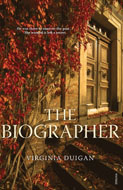 | Virginia Duigan THE BIOGRAPHER Random House, 321 pp. Source: review copy Review by Perry Middlemiss |
The biographer's role is a strange and complex one: part detective, part confessor, part social worker, and part schoolyard bully. Is it all worth it? Does the end product justify the journey? Does it help or injure the subject? And what of the people around them - the family and friends? Even if the subject is dead a good juicy biography surely must dig the dirt. And if the subject is still among the living, well then, all the better.
It's a teasing prospect to watch someone rummage through dirty linen, even ironed and well-aired linen. We are all voyeurs of a sort. But normally we only get to see the end product - the biography - divorced from the subject and presented by the biographer with all his or her prejudices to the fore. Virginia Duigan's new novel The Biographer attempts to reverse that process somewhat, giving us a version from the subject's point of view.
Greer Gordon ran away from a new career and a new marriage with Czech-born painter, Mischa Svodoba, in the 1980s, severing all contact with her family and friends in Australia. Twenty-five years later he is a world-renown artist, and the two of them live in a Tuscan commune with Rollo, another artist, and his partner Guy in a hilltop group of houses that they have all gradually renovated over the years. Into this small community comes Tony, a young art critic who is researching a biography of Mischa. We learn very soon that Tony is near the end of his researches and that his time in Tuscany will be used in tying up some loose ends of the knot that is Mischa's life, and, possibly, attempting to extract the last possible drop of blood out of the artist's relationships, though, of course, Tony puts it rather more delicately than that.
But Mischa proves to be rather elusive. Not in a physical sense, as he is always there somewhere, in his studio working, or eating and drinking with the others. His distance comes from his very nature, his drive to succeed at his art. All else is background noise, and he tends to ignore Tony whenever possible, even though it was he who initially invited Tony to Italy. So Tony finds himself getting little out of the artist - his main subject - and he slowly turns his attention to Greer, or Gigi as she is now known.
Is this really the way it has turned out, by chance, or did he come to the commune fully intending to concentrate on Gigi in the first place? And if that's the case then does he have anything up his sleeve or is he of the view that she will prove to be an easier target?
The novel is told mostly from Gigi's point-of-view and, as she questions Tony's every move and motive, she also examines her own life with Mischa, reading back over an old diary that she keeps hidden from everyone, especially the biographer. The forward thrust of the novel is controlled by the flashbacks to her earlier life, instigated by passages in her diary, and the present-day machinations of Tony as he fills in gaps in his understanding of the artist's life. And, slowly, the reader starts to realise there is something else lurking in the background, something unspoken and painful. The touch has to be just right for this to work. Too light and you don't care for the characters nor for whatever happens to them; too heavy and it dives into sentimentality, which is just another route to "not-very-good".
Duigan handles the authorial weight here very well. She steers a delicate path between the traps she sets for herself and arrives at an endpoint that is neither mawkish nor obvious. For just a moment in the last few chapters I thought she was going to succumb to what I keep thinking of as a "soap-opera" ending. A lesser writer would have taken the low road to cliché and ruined all the good work in the rest of the novel. Duigan doesn't, and this reader closed the book with a sense of deep satisfaction.
